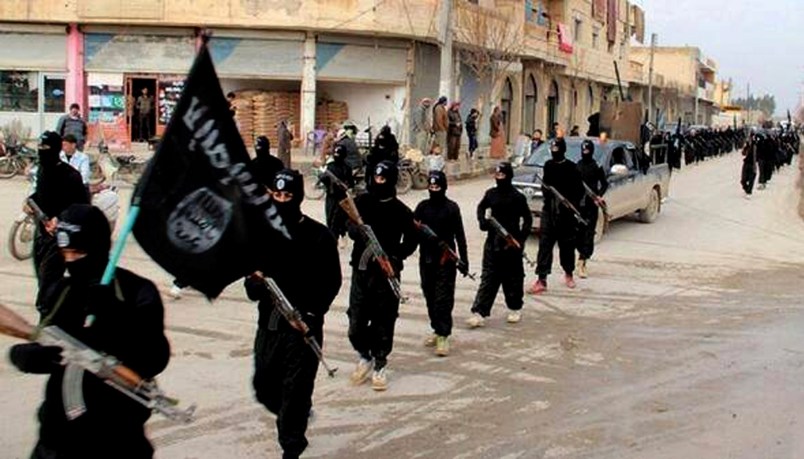I just read an article in Haaretz that got me thinking again about a topic I’ve been mulling off and on for the better part of twenty years: namely, is part of the appeal of radical Islam tied the lack of a radical, trans-national revolutionary movement such as existed through the Cold War and in more diffuse respects for decades before that? The article itself is about the fact that a very high proportion of the ‘foreign fighters’ in ISIS and in other rebel groups in Syria/Iraq are ethnic European converts. In other words, not first or second generation naturalized immigrants from the MENA region or Central or South Asia, but white Britons, Germans, French and Belgians who’ve not only converted to Islam but into its most extreme, totalizing variant. In some cases, men (yes, largely men) who have little more than a passing knowledge of the basics of Islamic ritual practice.
A few statistics from the article …
The countries that apparently export the most Islamic State fighters are France (700 men, according to President Francois Hollande); the United Kingdom (at least 500, according to the Soufan Group, an international strategic consultancy firm); Germany (about 320, according to local news reports); and Belgium (approximately 350, according to The New York Times).
The gist of the article that while ethnic European converts to Islam make up only a tiny portion of the Muslim populations of these countries (not surprising) they make up a majority or even an overwhelming majority of the foreign fighters in Syria, especially with ISIS.
And then this …
“There are people fighting with the Islamic State who don’t even know how to correctly recite the Shahada,” he says, referring to the Islamic declaration of faith. “They just want to fight the system, and to them jihadi groups have the same kind of appeal that radical left-wing terrorism used to have in the 1970s.”
As I said above, this is an idea I’ve been mulling in different ways since the late 1990s. Throughout the Cold War, there was a set place for Westerners who wanted a total opposition to liberal democracy and capitalism – either communism (though the appeal of Soviet-style communism waned in the second half of the Cold War) or the various strains of revolutionary socialism that emerged during the Cold War, whether it was Maoism, Cuba-inspired revolutionaries or the various left-wing terrorist groups in Europe like the Red Brigade or the Baader-Meinhof Gang.
I don’t mean to denude these movements of all their politics or portray them as mere matters of personal expression. Nor do I want to reduce Islam to its pretty tiny (though highly dangerous) ISIS-like variant. But if you wanted to say, No to the entire edifice of capitalism and democracy and liberalism, there was a cluster of related ideologies on hand to buy into. And many did. Some as personal belief, others as dilettantes, others committing and even losing their lives.
For a while I thought the 90s-era anti-globalization movement might fill that role. But it was always too soft and limited to fill this role.
This was one of the significant outgrowths of the end of the Cold War. Marxism wasn’t any more or less true in 1975 than in 1995. But it had lost its key global patrons – a very big deal. And at a basic level that was clear even to many former devotees it had discredited itself as a vehicle for human betterment or whatever other eschatological hopes it raised for its adherents.
As I’ve suggested, there’s no perfect way to divide these things. But to the extent we can, I’m trying to distinguish between political programs and the deeper impulse – perhaps psychological or puristic – for radicalism and often violent opposition. The problem was or is that even though these 20th century revolutionary movements were or appeared to be largely played out, that didn’t mean there was any less abject suffering in the world or examples of injustice. It also didn’t mean that impulse for escape, radical purity and justice of an often disfigured sort was any less present.
This was one of the oddities of the 1990s. At least at a superficial level, perhaps at the elite level, there was just the Washington Consensus. Everybody embraces globalizing liberal capitalism, perhaps with some mild social democratic overlay and that’s it. But even apart from the shortcomings of the Washington Consensus, which became increasingly apparently in the following decade, culminating in the 2008 crisis, this is hardly a sustainable condition, even in what might be called quasi-Newtonian terms. If there’s no radical ideological of opposition, the world will have to create one, pull something up from the deep pools of humanity to fill this role.
In key respects this transition was already happening in the late Cold War in the Arab World where secular socialism was losing ground to Islamist movements in almost every country in the Middle East. Nasserism to the Muslim Brotherhood, Fatah to Hamas, Baathism to Islamic undergrounds in Syria and Iraq, etc. etc.
I don’t have a fully formed theory on this. But in Europe and perhaps in other parts of the world where Islam is growing but not the dominant religion this is a key part of the equation.






